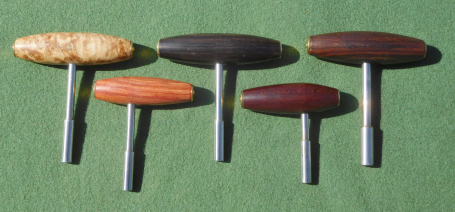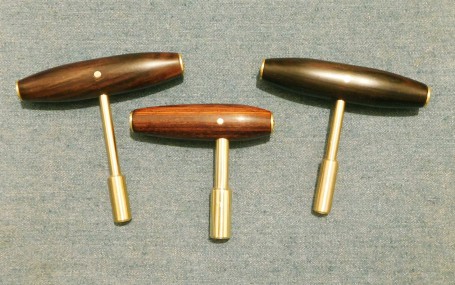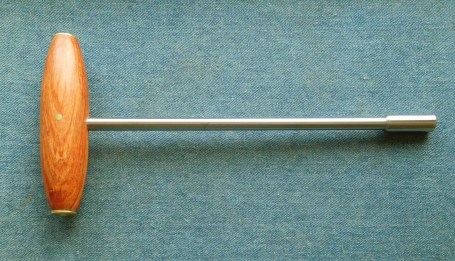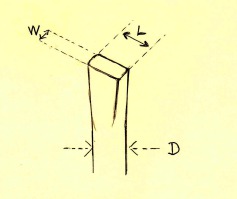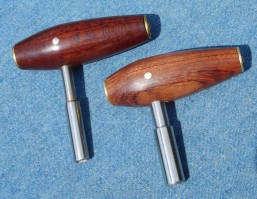
Tuning and Tuning Hammers
Early keyboard Instruments, whether originals or replicas, do require more frequent tuning than modern iron-framed pianos. The costs of professional tunings do mount up, and it can be a problem finding a tuner who is happy to work with our ancient instruments. For this and other reasons, most of us do our own tuning. To offer some help to those thinking of having a go, I have prepared a short PDF guide.
Adobe Acrobat document [559.9 KB]
It is very important to have a properly-fitting tuning hammer, which should bear on a good portion of the two flat faces of the wrestpin (tuning-pin). If the fit is too sloppy, the corners of the pin and the socket of the tuning hammer will be damaged, and the backlash makes accurate tuning difficult anyway. It it is too small, it will grip the top of the pin only, with the same result.
I am now able to offer a limited number of hand-made hammers tailored to your own pins.
I have recently made some hammers with brass stems rather than steel. Brass is a softer metal, of course, and so these are really only suitable for harpsichords and early pianos with well-fitted pins, and not for removing any that are seized-up! But I think they are much prettier, and I have been using them on my own instruments for a while now. Subject to this caution, I now feel happy to offer them as an alternative. The handles below are in Indian Rosewood (left), African Blackwood (right) and Cocobolo (Broadwood special lopsided).
Also available - a long-reach version, see picture below. We have recently restored a clavicytherium, where the proximity of the pins to the keys makes using a conventional hammer difficult. This style could also be useful for adjusting the set-off on English grands.
Please note that these hammers are only suitable for original style oblong-headed pins, and for early instruments with relatively light stringing. It is best to fit the hammer directly to a sample pin, but if it is not convenient to remove one, the data can be summarised by measuring accurately (to within 0.1 mm - use a micrometer or caliper gauge) the three dimensions indicated in the sketch below.
I have made a number of very short and lopsided hammers; these have proved popular with owners of Broadwoods and other pianos with the pins at the back, and also with spinet owners. In both cases the lid makes tuning difficult (unless it can be thrown right back) and these special hammers can help. They don’t look as elegant as the long-stemmed symmetrical type, but they are quite practical!
I do have a few hammers ready-made, but otherwise you have a choice of decorative woods for the handle - this is useful if you have more than one hammer.
The price is £55 per hammer, plus postage. Due to persistent problems with loss, damage, and delay with standard mail, I now prefer to send them 'Small Parcel Tracked and Signed'. Current rate £6.19 UK. Overseas e.g. Europe £10.90, USA £12.50.
Payment by PayPal preferred.
If you are interested, please send an email to David on friends.sp@btinternet.com
